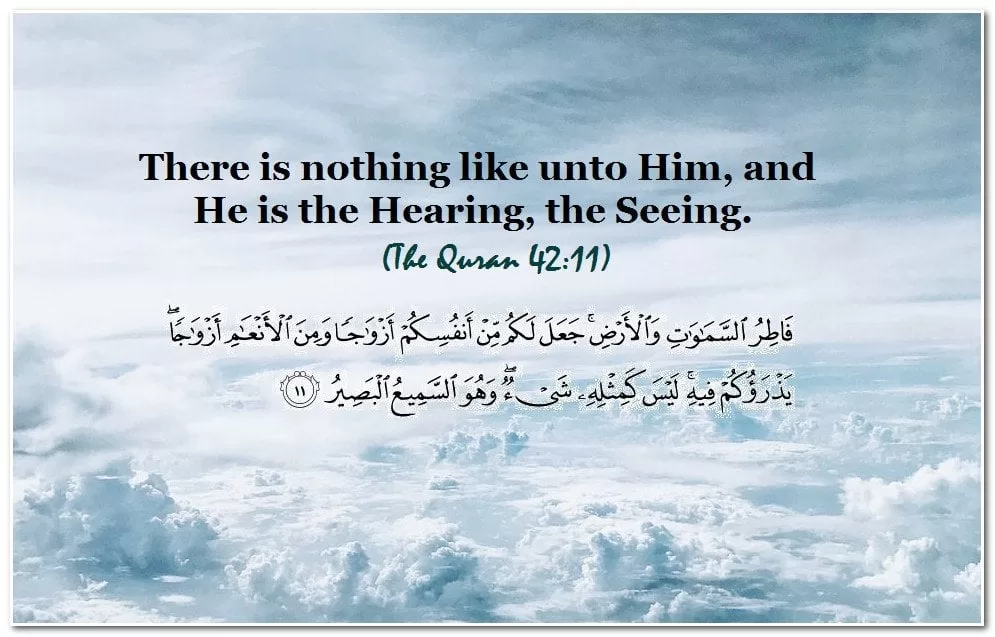Extracts
So tell the tale — perhaps they will reflect. [Koran 7:176]
General
Last month the names of God were discussed. In Islam, the Quran serves as the expression of God, detailing His attributes through various names, such as Merciful and Knowing. These names, though numerous, are not personal but signify qualities of God. Central to Islam is “Tawhid,” the belief in God’s oneness which asserts that all His qualities belong solely to Him. The Shahadah, “There is no god but God,” encapsulates this belief. Each divine name reflects an aspect of God’s essence, with “al-haqq” (the Real) highlighting Tawhid’s concept. Despite the recognition of human reality as relative to God’s absolute reality, Tawhid brings confidence and faith by affirming that all positive qualities originate from God alone, fostering a convergence of knowledge and faith in Islam.[1]
Speech
God manifests his signs through speaking. As already mentioned, Muslims view the Koran and other scriptures as God’s speech. The words and sentences of God’s speech are known as signs. But just as God reveals the signs of scripture through speaking, he also reveals the cosmic and natural signs through speaking. In the Hebrew Bible, God begins creation by saying, “Let there be light.” In the view of many Muslim theologians, all creativity is a function of God’s speech. Many Koranic verses mention God’s word or words. Take, for example, the following verse:
Though all the trees in the earth were pens, and the sea and seven seas after it supplied it with ink, yet the words of God would not be spent. God is Mighty, Wise. (31:27)
At first sight, this verse seems to be talking about scripture. But many commentators understand it as a reference to God’s creative power. Every creature comes into existence when God says to it “Be!” so each creature is a word of God. God’s creative power is infinite, so his creatures never cease coming into existence. Because of the Koranic theme of creation through speaking, many Muslim thinkers employ the imagery of speech as a means to suggest the relationship between God and the world. Human speech is taken as a sign of divine speech. How do we create words? God creates creatures in a similar way.
When we speak, we begin with the intention of saying something, even if the intention is not clear to us. Speech does not appear unintentionally—even sudden expressions are a communication of an inner feeling or idea, such as surprise or pain. We want to express an idea, so we speak. Of course, we are just human beings, with all sorts of imperfections, so our words often come out muddled, and we find that we are not able to say what we want to say. The situation is different with God, since he is free of our limitations. His words come out just as he wants them. But that does not mean that we necessarily understand them. The Koran repeatedly instructs people to ponder the signs of God in order to find out what God is saying. God is speaking clearly, but his listeners are not so bright.
If we continue using human speech as an analogy, we find many interesting parallels between it and God’s speech. For example, what is the relationship between a spoken word and its speaker? The word is certainly not the same as the speaker, since the word is there for an instant and then disappears. But the word is not completely different from the speaker either, because there could be no word without the speaker. The words are utterly dependent upon the speaker for their existence. In the same way, each of God’s creatures exists only for an instant (from the point of view of eternity), and each of them is utterly dependent upon God for its existence. He speaks a word, and it may seem to us to last for ages, but in God’s view of things,
Everything is perishing but His face” (28:88).
Some theologians have compared the universe to a book that is being written out by God. Each thing in the universe is a letter. The letters join to become words. Birds, flowers, stones, and trees are all words composed of letters. The letters may be the same in each case, but they are put together in different combinations, thus giving us different words. We could call heads, tails, arms, legs, hearts, and livers “letters.” Most animals have these letters, but they are put together somewhat differently in each case. Plants and minerals are spelled with altogether different letters.

Letters have no meaning on their own. When you put them together, they are words, which have meanings. However, words really have no meaning except in the context of a sentence. Without a context, we can never be completely sure what a word means. And if we want a sentence—that is, an expression that makes sense—we cannot string words together haphazardly. In the same way, God’s cosmic words, such as elephant, garlic, and cockroach, have meaning only in the context of the natural world in which they are found.
Continuing with the image of a universe as a book, we can say that each sentence needs to be placed within a chapter, or a sura, which, as we saw earlier, means literally an enclosure. The suras of the universal book are like the worlds of our universe. But each world is related to other worlds in some way. In terms of modern astronomy, each star and galaxy interrelates with all the others, though we may not be quite sure how the relationships work. In Islamic terms, any world only makes sense in relation to the worlds that surround it, whether spatially or temporally. As we will see later, Islamic cosmology looks at our own experienced world as one of several worlds that exist simultaneously, and it also looks upon it as one in a series that come one after another. The whole significance of our world can only be grasped if we see how it fits into those other worlds, just as the whole significance of a chapter depends upon the book of which it is a part.
In short, by comparing the universe to a book of God, Muslim thinkers are saying that the universe is a collection of signs that has a message. But we have to be able to see the signs in the context of the whole in order to understand the message. The theme of God’s book is of course tawhid, the declaration that God is the unique reality underlying all appearances.
Essence And Attributes
The Koranic names of God have provided Muslims with an endless source for meditation on the nature of reality. Discussion of the names of God does not entail some abstract and irrelevant endeavor having nothing to do with the real world. Quite the contrary, the signs of the divine names are present in everything we do and everything we are. If the universe and our own existence are nothing but a panorama of divine signs, these signs are telling us who God is, or what his names are.
God’s names are also referred to as attributes, since they designate qualities and characteristics. God has the attributes of generosity and justice, so two of his names are the Generous and the Just. We might also say that Elizabeth is generous and just. The difference is that in the case of God, these attributes are absolute, while in the case of Elizabeth, they are relative. To say that God is generous means that “There is none generous but God,” and nothing else truly deserves to be called generous. But to say that Elizabeth is generous simply means, “relative to most people.” We are saying, for example, that she is free with her time and enjoys helping people, whereas most people are not willing to devote that much of their attention to others.

Muslim thinkers have frequently classified the names of God into different categories in order to illustrate what sorts of things we can know about God. For example, the names can be divided up into three groups.
The first group of names tells us what God is not, the second tells us what he is, and the third tells us how he interrelates with the universe.
These can be called
the “names of God’s essence,”
the “names of his attributes,” and
the “names of his acts.”
The essence (dhat) of something is its reality, its innermost core that defines it and makes it what it is. For example, we can ask what the essence of a cow is, and if we study the matter we may come up with a statement that defines what is absolutely essential to a cow in order for it to be a cow rather than a horse or a donkey.
In the case of God, the question is, What is God’s very self? What is the fundamental reality of God that makes him a God and nothing else, or that differentiates God from everything in the cosmos? A typical answer is that God is not like anything else, while everything in the universe is like something or other. What distinguishes God from the things is precisely that he is utterly distinct from them in every way. But human beings, for example, are like cows and donkeys and other animals; they are also like minerals in certain respects.
Everything in the universe has some sort of similarity with human beings. More precisely, everything is similar to everything else in some way or another. God alone is distinct from all things. Hence we can say that his essential characteristic is that he is not similar to anything else. In brief,
“Nothing is like Him” (42:11).
God’s essence is what he is and what everything else is not. But what exactly is that? He is not any exact thing, or else he would be similar to other exact things through this exactness.
But Nothing Is Like God.
This type of discussion always sounds a bit puzzling, since it is a complicated way to say that we are unable to grasp what God is. But admitting that we do not know what God is means that we know that we do not know. How do we know? Because the Koran says, “Nothing is like Him.” We know things by knowing what they are like. If we know that they are like nothing at all, then we know that we do not know them. But this ignorance is itself wisdom, because it allows us to understand a fundamental sense of tawhid.
“There is no god but God” means that “There is no knowledge but God’s knowledge,” and “None truly has knowledge but God.” As Muslim theologians have expressed the idea, “None knows God but God.”

When people know that they do not know, this is called, in Islamic texts, simple ignorance. In contrast, when they do not know that they do not know, this is called compound ignorance. Muslims see simple ignorance in the face of God as wisdom. In contrast, they consider compound ignorance the worst of fates.
One who is compoundly ignorant about God thinks that he knows what God is. Anyone who thinks this has missed the point of the first Shahadah, and therefore stands outside the pale of humanity. This is why we said earlier that many Muslims find it easy to agree with those who say, “I do not believe in God,” because, simply by asking those people what they mean, they find out that such people have a very definite idea of what God is, and this idea is always unacceptable.
We began by saying that there are names that are used to designate God’s essence. These are names that tell us what God is not. Since God’s essence cannot be explained to human beings in positive terms, negative names help people understand their own limitations. An example of a negative name is quddus, which is usually translated as “Holy.” The Arabic term means that;
God is beyond every imperfection and stain that is imaginable for created things. Another negative name is subbuh (Glorified).
In other words, God’s glory, greatness, and transcendence is such that he is beyond all creaturely understanding. Another is salam (Peace). This name means that God is free of every sort of disharmony and disequilibrium, every strife and war. Still another negative name is ghani (Independent). God does not depend upon anything in the universe and is free of all the dependencies that define the natures and limitations of creatures.
If names of the essence tell us what God is not, names of the attributes tells us what God is. Although God in his very self cannot be fathomed, we can know what sort of qualities he chooses to reveal to us through his signs. There is no contradiction between God’s unknowability and knowability. After all, the same thing can be said about any human being. We can say that Bob is alive, knowing, desiring, powerful, seeing, and hearing. Fine, but how much does that tell us about Bob’s uniqueness, or about Bob as he really is in himself? Would Bob be satisfied that we have mentioned everything important about him by listing those attributes?
Again, what exactly defines the human species, of which Bob is one example? At one time, anthropologists might have told us that a human being is a tool-making animal, but that is simply a rough description. None of us would be ready to say,

“All right, I am a tool-making animal and that’s that. The rest of me you can have. From now on, I will make tools. My family is irrelevant, my pains and complexes are irrelevant, my loves and hates are irrelevant. Take it all!”
Of course, we could not give away the rest even if we wanted to. And we still do not know what we are. Every day, if you pay close attention, you will find new facets to your own existence.
In short, we can say about a person that he is this or that, but whatever we say, we cannot exhaust the reality of that person. In the same way, to say that God is this or that does not exhaust God’s reality—far from it. God is the infinitely and absolutely Real, about which the relatively real can know but little. We can understand reality to the extent that we are real. And that raises the question of how real we are. That is what tawhid is all about.
The limitations of human knowledge are obvious in the scientific sphere. Despite all the discoveries that are constantly being made, few people really imagine that the universe is near to being understood. The human race has still not fathomed an infinite number of phenomena on the face of the earth and in its depths. How can we really fathom our own star, for example, or our galaxy, or the trillions of galaxies in the universe? Compared to what is potentially knowable in scientific terms, present human knowledge might as well be called pure ignorance. As for God, “Nothing is like Him.” Knowledge of the whole universe would not necessarily help us understand God.
In short, names of attributes are names that designate what God is, at least for practical purposes of human understanding. The attributes we just gave to Bob are also names of God’s attributes: Alive, Knowing, Desiring, Powerful, Hearing, Seeing. Again, the difference between God and Bob is that God’s attributes are real, while Bob’s are a pale reflection of reality. Human life is not really life, since it disappears very quickly, but God’s life is eternal. Thus, “Nothing is like Him” applies also to the names of God’s attributes. Having said that God is Alive, we also have to remember that his life is not like our life or any other kind of life we might understand. A third category of names can be called names of acts. The acts are God’s creatures, or the results of his activity. Names of acts are distinguished by the fact that they make sense only in terms of creatures and that they have opposites that are also God’s names. Examples are Lifegiver and Slayer, Exalter and Abaser, Forgiver and Avenger.

In the case of names of attributes, it is not necessary to suppose that there be a creation. God is Alive, but this does not demand that anything else be alive. God is Knowing, but this does not mean that there has to be a universe that he knows. Perhaps he knows only himself. Moreover, the opposites of the names of attributes cannot be applied to God. God is not dead, nor is he ignorant. In contrast, the names of acts demand creatures. God cannot give life to himself, since he is already alive. Nor can he slay himself, since his life is eternal by definition. Hence the name Life-giver only makes sense in terms of God’s acts. And so also, if he can perform one act, he can perform its opposite. If he can give life, he can also take it away. He exalts some creatures, but he abases others. He forgives some people for their sins, but he exacts vengeance from others for their disobedience.
Finally, to prevent any possible misunderstanding, let us repeat that this classification is one of many possible ways of meditating upon God’s names. There is nothing final about it, and we present it simply as an example of the type of thinking that goes on when Muslim theologians consider the fact that God ascribes many names to himself in the Koran.
To be continued ……
Book Reference:
Vision of Islam[2]
[1] “The Vision of Islam” authored by Dr. Sachiko Murata and Dr. William C. Chittick
[2] Islam of Vision اردو ترجمہ مکمل کتاب
http://www.williamcchittick.com/wp-content/uploads/2019/06/ Chittick-and-Murata-Vision-of-Islam-Urdu-Translation-by-Muhammad-Suheyl-Umar.pdf





